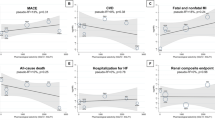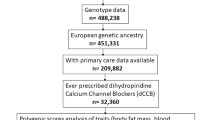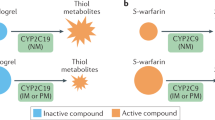Abstract
The mechanistic effects of intravenous glucose, insulin and potassium (GIK) in cardiac ischemia are not well understood. We conducted a genetic sub-study of the Immediate Myocardial Metabolic Enhancement During Initial Assessment and Treatment in Emergency care (IMMEDIATE) Trial to explore effects of common and rare glucose and insulin-related genetic loci on initial to 6-h and 6- to 12-h change in plasma glucose and potassium. We identified 27 NOTCH2/ADAM30 and 8 C2CD4B variants conferring a 40–57% increase in glucose during the first 6 h of infusion (P<5.96 × 10−6). Significant associations were also found for ABCB11 and SLC30A8 single-nucleotide polymorphisms (SNPs) and glucose responses, and an SEC61A2 SNP with a potassium response to GIK. These studies identify genetic factors that may impact the metabolic response to GIK, which could influence treatment benefits in the setting of acute coronary syndromes (ACS).
This is a preview of subscription content, access via your institution
Access options
Subscribe to this journal
Receive 6 print issues and online access
$259.00 per year
only $43.17 per issue
Buy this article
- Purchase on Springer Link
- Instant access to full article PDF
Prices may be subject to local taxes which are calculated during checkout




Similar content being viewed by others
References
Grossman AN, Opie LH, Beshansky JR, Ingwall JS, Rackley CE, Selker HP . Glucose-insulin-potassium revived: current status in acute coronary syndromes and the energy-depleted heart. Circulation 2013; 127: 1040–1048.
Selker HP, Raitt MH, Schmid CH, Laks MM, Beshansky JR, Griffith JL et al. Time-dependent predictors of primary cardiac arrest in patients with acute myocardial infarction. Am J Cardiol 2003; 91: 280–286.
Selker HP, Beshansky JR, Griffith JL, D'Agostino RB, Massaro JM, Udelson JE et al. Study design for the immediate myocardial metabolic enhancement during initial assessment and treatment in emergency care (IMMEDIATE) trial: a double-blind randomized controlled trial of intravenous glucose, insulin, and potassium for acute coronary syndromes in emergency medical services. Am Heart J 2012; 163: 315–322.
Selker HP, Beshansky JR, Sheehan PR, Massaro JM, Griffith JL, D'Agostino RB et al. Out-of-hospital administration of intravenous glucose-insulin-potassium in patients with suspected acute coronary syndromes: the IMMEDIATE randomized controlled trial. JAMA 2012; 307: 1925–1933.
Hindorff LA, Junkins HA, Hall PN, Mehta JP, Manolio TA A catalog of published genome-wide association studies. Available at: www.genome.gov/gwastudies; accessed July 2013.
Huyghe JR, Jackson AU, Fogarty MP, Buchkovich ML, Stancakova A, Stringham HM et al. Exome array analysis identifies new loci and low-frequency variants influencing insulin processing and secretion. Nat Genet 2013; 45: 197–201.
Voight BF, Kang HM, Ding J, Palmer CD, Sidore C, Chines PS et al. The metabochip, a custom genotyping array for genetic studies of metabolic, cardiovascular, and anthropometric traits. PLoS Genet 2012; 8: e1002793.
Grove ML, Yu B, Cochran BJ, Haritunians T, Bis JC, Taylor KD et al. Best practices and joint calling of the humanexome beadchip: the charge consortium. PLoS ONE 2013; 8: e68095.
Goldstein JI, Crenshaw A, Carey J, Grant GB, Maguire J, Fromer M et al. Zcall: a rare variant caller for array-based genotyping: genetics and population analysis. Bioinformatics 2012; 28: 2543–2545.
Price AL, Patterson NJ, Plenge RM, Weinblatt ME, Shadick NA, Reich D . Principal components analysis corrects for stratification in genome-wide association studies. Nat Genet 2006; 38: 904–909.
Manning AK, LaValley M, Liu CT, Rice K, An P, Liu Y et al. Meta-analysis of gene-environment interaction: Joint estimation of snp and snp x environment regression coefficients. Genet Epidemiol 2011; 35: 11–18.
Wu MC, Lee S, Cai T, Li Y, Boehnke M, Lin X . Rare-variant association testing for sequencing data with the sequence Kernel association test. Am J Hum Genet 2011; 89: 82–93.
Lee S, Emond MJ, Bamshad MJ, Barnes KC, Rieder MJ, Nickerson DA et al. Optimal unified approach for rare-variant association testing with application to small-sample case-control whole-exome sequencing studies. Am J Hum Genet 2012; 91: 224–237.
Li J, Ji L . Adjusting multiple testing in multilocus analyses using the eigenvalues of a correlation matrix. Heredity (Edinb) 2005; 95: 221–227.
Zeggini E, Scott LJ, Saxena R, Voight BF, Marchini JL, Hu T et al. Meta-analysis of genome-wide association data and large-scale replication identifies additional susceptibility loci for type 2 diabetes. Nat Genet 2008; 40: 638–645.
Grarup N, Andersen G, Krarup NT, Albrechtsen A, Schmitz O, Jorgensen T et al. Association testing of novel type 2 diabetes risk alleles in the jazf1, cdc123/camk1d, tspan8, thada, adamts9, and notch2 loci with insulin release, insulin sensitivity, and obesity in a population-based sample of 4,516 glucose-tolerant middle-aged Danes. Diabetes 2008; 57: 2534–2540.
Warton K, Foster NC, Gold WA, Stanley KK . A novel gene family induced by acute inflammation in endothelial cells. Gene 2004; 342: 85–95.
Yamauchi T, Hara K, Maeda S, Yasuda K, Takahashi A, Horikoshi M et al. A genome-wide association study in the Japanese population identifies susceptibility loci for type 2 diabetes at ube2e2 and c2cd4a-c2cd4b. Nat Genet 2010; 42: 864–868.
Dupuis J, Langenberg C, Prokopenko I, Saxena R, Soranzo N, Jackson AU et al. New genetic loci implicated in fasting glucose homeostasis and their impact on type 2 diabetes risk. Nat Genet 2010; 42: 105–116.
Saxena R, Hivert MF, Langenberg C, Tanaka T, Pankow JS, Vollenweider P et al. Genetic variation in gipr influences the glucose and insulin responses to an oral glucose challenge. Nat Genet 2010; 42: 142–148.
Boesgaard TW, Grarup N, Jorgensen T, Borch-Johnsen K, Hansen T, Pedersen O . Variants at dgkb/tmem195, adra2a, glis3 and c2cd4b loci are associated with reduced glucose-stimulated beta cell function in middle-aged Danish people. Diabetologia 2010; 53: 1647–1655.
Grarup N, Overvad M, Sparso T, Witte DR, Pisinger C, Jorgensen T et al. The diabetogenic vps13c/c2cd4a/c2cd4b rs7172432 variant impairs glucose-stimulated insulin response in 5,722 non-diabetic Danish individuals. Diabetologia 2011; 54: 789–794.
Rose CS, Grarup N, Krarup NT, Poulsen P, Wegner L, Nielsen T et al. A variant in the g6pc2/abcb11 locus is associated with increased fasting plasma glucose, increased basal hepatic glucose production and increased insulin release after oral and intravenous glucose loads. Diabetologia 2009; 52: 2122–2129.
Prokopenko I, Langenberg C, Florez JC, Saxena R, Soranzo N, Thorleifsson G et al. Variants in mtnr1b influence fasting glucose levels. Nat Genet 2009; 41: 77–81.
Chimienti F, Devergnas S, Favier A, Seve M . Identification and cloning of a beta-cell-specific zinc transporter, znt-8, localized into insulin secretory granules. Diabetes 2004; 53: 2330–2337.
Sladek R, Rocheleau G, Rung J, Dina C, Shen L, Serre D et al. A genome-wide association study identifies novel risk loci for type 2 diabetes. Nature 2007; 445: 881–885.
Lyssenko V, Jonsson A, Almgren P, Pulizzi N, Isomaa B, Tuomi T et al. Clinical risk factors, DNA variants, and the development of type 2 diabetes. N Engl J Med 2008; 359: 2220–2232.
Ingelsson E, Langenberg C, Hivert MF, Prokopenko I, Lyssenko V, Dupuis J et al. Detailed physiologic characterization reveals diverse mechanisms for novel genetic loci regulating glucose and insulin metabolism in humans. Diabetes 2010; 59: 1266–1275.
Watson HR, Wunderley L, Andreou T, Warwicker J, High S . Reorientation of the first signal-anchor sequence during potassium channel biogenesis at the sec61 complex. Biochem J 2013; 456: 297–309.
Kang HP, Yang X, Chen R, Zhang B, Corona E, Schadt EE et al. Integration of disease-specific single nucleotide polymorphisms, expression quantitative trait loci and coexpression networks reveal novel candidate genes for type 2 diabetes. Diabetologia 2012; 55: 2205–2213.
Acknowledgements
The Genetic Ancillary Study was funded by the National Institutes of Health (NIH) grant from National Heart, Lung and Blood Institute (NHLBI) (R01HL090997). This work was also supported by National Center for Research Resources Grant Number UL1RR025752, now the National Center for Advancing Translational Sciences, NIH Grant Number Ul1 TR000073. The IMMEDIATE Trial was funded by the NIH cooperative agreement from NHLBI (U01HL077821, U01HL077823 and U01HL077826).
Author information
Authors and Affiliations
Corresponding author
Ethics declarations
Competing interests
The authors declare no conflict of interest.
Additional information
Supplementary Information accompanies the paper on the The Pharmacogenomics Journal website
Supplementary information
Rights and permissions
About this article
Cite this article
Ellis, K., Zhou, Y., Beshansky, J. et al. Genetic variation at glucose and insulin trait loci and response to glucose–insulin–potassium (GIK) therapy: the IMMEDIATE trial. Pharmacogenomics J 15, 55–62 (2015). https://doi.org/10.1038/tpj.2014.41
Received:
Revised:
Accepted:
Published:
Issue Date:
DOI: https://doi.org/10.1038/tpj.2014.41



